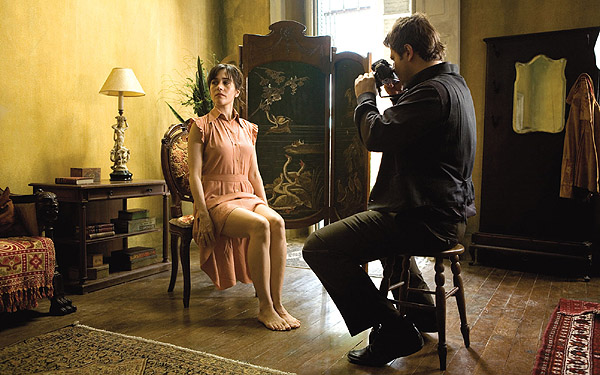 |
|
ARTS |
CULTURE |
|
Mission Newsletter |
|
The Origin of the World Review by Diego Costa A nation on a one-genre film diet produces the malnourished cinematic bodies of its lack of experimentation. Brazil, ever so eager to accept the Hollywood junk it consumes and yet so "guerilla" in the cinema it produces with its own hands, shows what such "avant-garde anemia" does to a pair of experimentally-inclined hands in Júlio Bressane's A Erva do Rato (The Herb of the Rat, L'Herb du Rat.) 
Based on stories by uber-aclaimed Brazilian writer Machado de Assis (1839-1908), The Herb of the Rat observes a man dictating prose to a woman, who is always already his. She writes his words down, at times overcome by their beauty or a personal reaction that she quickly muffles. They treat this like work, but it seems that its only goal is the process itself. This is a game of monologist designation and mimesis: he speaks, she copies it. Soon the woman puts down her pen and becomes muse for his photographs, losing all function but that of captured object. A rat eventually shakes up the order of things, gnawing its way from the photographs to the insides of the woman's vagina. And then, no matter how many mousetraps the man sets up around the house, he is no longer needed. The woman finds pleasure within her own body. And since all the woman ever was was a "other" body to project to and refract from, the man finds a way to sustain the rules of his game without her. Brazilian cinema's history of raw, makeshift mentality filmmaking (Glauber Rocha) -- at times corrupted by hefty budgets and festival prize hunger (Walter Salles) - hasn't been able to keep up with its own unorthodox drives. Like the undergraduate film student so eager to capture the world, yet so reluctant to read up on it. Or the ivory tower academic whose theory adheres to her every pore, yet never had the opportunity for a tête-à-tête with her object of study. Bressane's experimentation in The Herb of the Rat, then, feels relentless in intent and shortcoming in execution, as if attempting to creating a(n)other grammar but unable - out of oblivion -- to use a different alphabet. He seems to take the task of cinematic deconstruction via partial incision, not structures. There is a kind of perfection to the costumes, the camera angle and its lifelessness that renders moot the unconventional length of the takes and the silences. The Herb of the Rat could still conceptually be a fantastic illustration for the work of feminist theorist Luce Irigaray with its suggestions of latent independence for female jouissance. But the actors move about and exchange dialogues in the manner of telenovelas, stiff and predictably. As if Bressane's experimentalism rested on shallow waters: on switching signs, not re-imagining them from scratch. |
(c)2008 - 2016 All contents copyrighted by AcousticLevitation.org. All contributors maintain individual copyrights for their works.